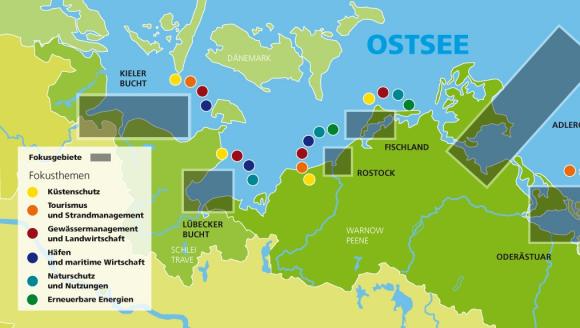Difference between revisions of "Radost"
SSchumacher (talk | contribs) (New page: Image:logo_radost.jpg [http://www.klimzug-radost.de/en Radost project homepage] The objective of RADOST - Regional Adaptation Strategies for the German Baltic Sea Coast is the devel...) |
SSchumacher (talk | contribs) |
||
| Line 20: | Line 20: | ||
Forums, bringing together experts and stakeholders to address important topics, will take place both on the general level, encompassing the project region and elsewhere, and at the local level in specific focus areas. | Forums, bringing together experts and stakeholders to address important topics, will take place both on the general level, encompassing the project region and elsewhere, and at the local level in specific focus areas. | ||
| + | |||
[[Image:radost_map.jpg]] | [[Image:radost_map.jpg]] | ||
| + | |||
RADOST is one of seven projects funded by the German Ministry of Education and Research (Bundesministerium für Bildung und Forschung ('''BMBF''')) within the ministry´s initiative '''KLIMZUG''' (“Regions adapt to climate change”). | RADOST is one of seven projects funded by the German Ministry of Education and Research (Bundesministerium für Bildung und Forschung ('''BMBF''')) within the ministry´s initiative '''KLIMZUG''' (“Regions adapt to climate change”). | ||
RADOST is coordinated by Ecologic Institute and will run from July 2009 to June 2014. | RADOST is coordinated by Ecologic Institute and will run from July 2009 to June 2014. | ||
Latest revision as of 14:53, 20 October 2011
The objective of RADOST - Regional Adaptation Strategies for the German Baltic Sea Coast is the development of adaptation strategies for the Baltic coastline of Germany through a dialogue between academics, economists, policy-makers and the public.
Other important goals are to minimize the economic, social and environmental harm and to capitalize on development opportunities brought about by climate change. Furthermore, the project aims to strengthen and extend the network and communication of the stakeholders on the Baltic coast and beyond.
The project structure of RADOST is organized into the following general fields ("modules"):
- Network building and regional dialogue
- Research in natural and engineering science
- Socio-economic analysis
- National and European political setting / national and international exchange
- Communication and dissemination of results
Networks and dialogue are centered on six focus topics that make up integral, climate-dependent economic industries and spheres of activity in the region. Results of engineering, environmental and socio-economic research are processed and then complemented by implementation-focused research. On-site implementation projects with local partners help to determine appropriate solutions.
Forums, bringing together experts and stakeholders to address important topics, will take place both on the general level, encompassing the project region and elsewhere, and at the local level in specific focus areas.
RADOST is one of seven projects funded by the German Ministry of Education and Research (Bundesministerium für Bildung und Forschung (BMBF)) within the ministry´s initiative KLIMZUG (“Regions adapt to climate change”).
RADOST is coordinated by Ecologic Institute and will run from July 2009 to June 2014.

